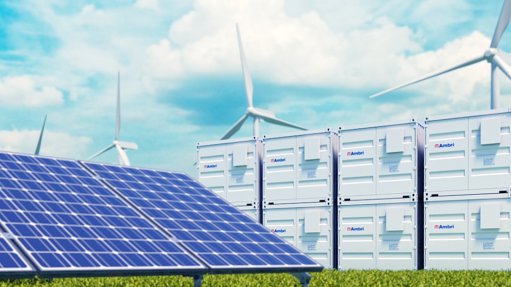Climate Council calls for green steel incentives
PERTH (miningweekly.com) – Australia’s Climate Council has called on the federal government to deliver strong policy and incentives to drive the transformation of industry, noting that the production of green metals in the region could be the country’s largest economic opportunity in the global shift towards net-zero emissions.
“A new global Industrial Revolution is underway as the world aims to get to net zero emissions and limit dangerous global warming, and this is shifting investment away from polluting industries towards clean ones,” climate councillor and independent economist Nicki Hutley said.
“To stay competitive in this net zero world, Australia’s heavy industries - including steelmaking, aluminium and metal production, cement, and chemical production - will need to undergo a big transformation, but the good news is that we have the resources and know-how to do this.”
In its latest report titled 'Australia’s Clean Industry Future', the Climate Council stated that assisting Australian industry cut emissions and get off fossil fuels could grow profits, create new clean industries, protect workers and create thousands of new jobs.
“Australia has some of the best solar energy resources on earth, and right beneath our feet we have some of the world’s largest reserves of critical minerals like iron-ore and bauxite. We can harness these world-class resources to become a world-leading industrial powerhouse and a nation leading on climate solutions,” chief climate councillor Professor Tim Flannery said.
“We can also use cheap renewable energy to power manufacturing as well as expand Australia’s capacity to refine and process raw materials onshore. This would spur job creation, develop clean new value-added industries, and significantly reduce emissions.”
The report noted that by producing green steel in Australia, through refining iron-ore mined locally, rather than exporting more than 90% of the raw materials overseas, the country could avoid 1.5-billion tonnes of greenhouse-gas emissions annually, and could generate ten times the profits compared to those generated by the iron-ore industry alone.
The report also found that the electrification of mine equipment, and switching to renewables in the grid, represented the greatest opportunities to decarbonise aluminium smelting and non-fossil fuel mining, while increasing renewables in the grid would also be crucial to manufacturing renewable hydrogen in Australia, which would be critical to decarbonise other industries.
Furthermore, ramping up renewable hydrogen production would mean Australia could decarbonise many of its industrial processes, such as replacing polluting gas in processes for ammonia and steelmaking.
Climate Council CEO Amanda McKenzie noted that the federal government’s reform of the Safeguard Mechanism is a critical opportunity to deliver the right policy settings to help future-proof industries, protect Australian manufacturing, and reduce harmful carbon pollution.
“If we get the Safeguard Mechanism right, this will drive green manufacturing and more great jobs to power the next era of Australian prosperity.”
The Climate Council’s recommendations for ensuring the Safeguard Mechanism supports strong Australian industries include prioritising crucial domestic industries that have a long-term future in a net zero world, directing government support to sectors such as steel, aluminium, cement and chemicals, and requiring large emitters, particularly fossil fuels, to deliver genuine emissions reductions, instead of just purchasing carbon offsets.
Comments
Press Office
Announcements
What's On
Subscribe to improve your user experience...
Option 1 (equivalent of R125 a month):
Receive a weekly copy of Creamer Media's Engineering News & Mining Weekly magazine
(print copy for those in South Africa and e-magazine for those outside of South Africa)
Receive daily email newsletters
Access to full search results
Access archive of magazine back copies
Access to Projects in Progress
Access to ONE Research Report of your choice in PDF format
Option 2 (equivalent of R375 a month):
All benefits from Option 1
PLUS
Access to Creamer Media's Research Channel Africa for ALL Research Reports, in PDF format, on various industrial and mining sectors
including Electricity; Water; Energy Transition; Hydrogen; Roads, Rail and Ports; Coal; Gold; Platinum; Battery Metals; etc.
Already a subscriber?
Forgotten your password?
Receive weekly copy of Creamer Media's Engineering News & Mining Weekly magazine (print copy for those in South Africa and e-magazine for those outside of South Africa)
➕
Recieve daily email newsletters
➕
Access to full search results
➕
Access archive of magazine back copies
➕
Access to Projects in Progress
➕
Access to ONE Research Report of your choice in PDF format
RESEARCH CHANNEL AFRICA
R4500 (equivalent of R375 a month)
SUBSCRIBEAll benefits from Option 1
➕
Access to Creamer Media's Research Channel Africa for ALL Research Reports on various industrial and mining sectors, in PDF format, including on:
Electricity
➕
Water
➕
Energy Transition
➕
Hydrogen
➕
Roads, Rail and Ports
➕
Coal
➕
Gold
➕
Platinum
➕
Battery Metals
➕
etc.
Receive all benefits from Option 1 or Option 2 delivered to numerous people at your company
➕
Multiple User names and Passwords for simultaneous log-ins
➕
Intranet integration access to all in your organisation
















